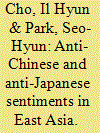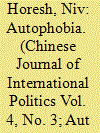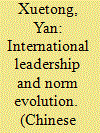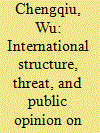|
|
|
Sort Order |
|
|
|
Items / Page
|
|
|
|
|
|
|
| Srl | Item |
| 1 |
ID:
107286


|
|
|
|
|
| Publication |
2011.
|
| Summary/Abstract |
Spanning the presidencies of George W. Bush and Barack Obama, anti-Americanism has become somewhat of a growth industry. Its products are avidly consumed not only in the United States but around the world, often for quite different political purposes. It is not surprising that anti-Americanism plays a large role among traditional enemies of the United States in the Middle East.1 But the same is true of America's allies just across the border, such as Canada and Mexico, and living far apart, such as Australia and New Zealand.2
It would be a big mistake, however, to think that these oppositional sentiments-the complex mixture of opinion, distrust and prejudice-are directed only against America. It plays a role in all parts of the world. Secondary or subordinate states in each world region resent the regional top dog. Such resentment can take various political forms. In Europe, latent anti-German feelings linger, sometimes very close to the surface. When Germany takes a stance against its partners in the European Union, as it has at various times in the unfolding financial crisis, historical anti-German sentiments are quick to appear. Small states in Latin America and Africa also harbour resentment against the self-proclaimed leadership roles of Brazil and Nigeria. And in the Middle East, cross currents of nationalism and religion generate different kinds of political resentment.
East Asia is no exception to this generalization. A large literature focuses on the role of history in shaping the region's current political fault lines. Even minor political crises of the day reveal lingering, deep resentments. In sharp contrast to Europe, however, painful historical memories continue to shape directly, even to provoke, current political crises. This is one important reason why, in a world of regions, East Asia differs from Europe.3 The heavy hand of history, however, has …
|
|
|
|
|
|
|
|
|
|
|
|
|
|
|
|
| 2 |
ID:
107287


|
|
|
|
|
| Publication |
2011.
|
| Summary/Abstract |
Recent popular unrest across the Arab world has sparked fresh debate over the scope of multinational intervention in 21st-century emergent humanitarian crises and the perimeters of promoting democratization in the developing world; it has also prompted reassessment of the United States' ability to maintain its system of longstanding regional alliances in the face of economic recession at home, and amid President Obama's apparent disowning of his predecessor's ebullient pre-emptive posture.
Barack Obama's attempts to defuse visceral anti-Americanism in the Arab world have been accompanied by assurances that the United States would speed up its pull-out from Iraq and Afghanistan. Coupled with an initially less belligerent approach to Iran's nuclear program than was postulated by George W. Bush, then followed by an initially cautious reaction to the Egyptian and Libyan uprisings, Obama's foreign policy has given rise to speculations about a possible scaling-down of U.S. immersion in the Middle East in favour of focusing on domestic issues and on better managing China's rise in the Asia-Pacific region.
From Israel, through to Saudi Arabia, and Australia, allies historically vulnerable to regional isolation of various kinds observe closely the Obama Administration's reactions to the demonstrations rocking the Arab world (and Iran); analysts in these countries often wonder about the significance of Obama's professed non-belligerence to their respective national-security interests. A few on the periphery of their countries' security establishments are even propelled to speculate openly that the United States might ultimately disengage from their arena in order to focus on domestic issues, or on other parts of the world.1
Framed within this changing geo-political landscape, this article will consider the current pulses shaping the Sino-Israeli relationship against the backdrop of the great civil unrest sweeping across the Arab World. It will start by identifying the historical policy narratives that have carried over …
|
|
|
|
|
|
|
|
|
|
|
|
|
|
|
|
| 3 |
ID:
107285


|
|
|
|
|
| Publication |
2011.
|
| Summary/Abstract |
Since the end of the Cold War, fast-paced globalization has increased interaction among states and promoted development of international norms in many fields. Constructivists argue that international interactions can only advance international norms towards a Kantian culture of friendly mutual help and could not propel any regression to a Hobbesian culture of hostile confrontation.1 We can observe, however, that the reality of international politics does not support this argument. Although certain interactions have promoted international cooperation, others have intensified international conflicts. For instance, China, the United States, Russia, Japan, South Korea and North Korea held during the five years from August 2003 to December 2008 seven rounds of Six Party Talks on nuclear issues on the Korean Peninsula. The six nations' continuous interaction during this period, however, resulted not in North Korea's acceptance of the norm of non-proliferation, but in its conducting on May 25 2009 its second nuclear test.2 This example calls to question whether or not interaction among states drives international norms in one specific direction. Drawing on the Pre-Qin philosophers' idea that the type of monarch has different impacts on relations among states, this article analyses how the different types of leadership of a leading power influence the process and direction of evolution of international norms.
|
|
|
|
|
|
|
|
|
|
|
|
|
|
|
|
| 4 |
ID:
107288


|
|
|
|
|
| Publication |
2011.
|
| Summary/Abstract |
In the first decade of the 21st century, United States foreign policy developed a dramatic trajectory, undergoing a unilateralist turn under President George W. Bush and a multilateralist turn under President Barack Obama.1 Under the Bush administration, the United States not only withdrew from or undermined such multilateral international treaties as the Kyoto Protocol, the Rome Statute establishing the International Criminal Court, the Biological Weapons Convention, and the Chemical Weapons Convention, but also disregarded collective security mechanisms and multilateral international organizations to pursue its own security agenda by invading Iraq in 2003 without explicit authorization from the United Nations. In contrast, under the Obama administration, the United States on the one hand restored its relations with European allies, Russia, Latin American countries, and the Islamic World, and on the other promoted soft diplomacy with regards to various global issues, including the recent financial crisis, climate change, and nuclear proliferation. The contrast is even more telling when we juxtapose the two presidents' National Security Strategy documents. The Bush administration adopted in September 2002 a new national strategy allowing for pre-emptive strikes, whereas the Obama administration's National Security Strategy released in May 2010 emphasized building US economic strength at home and shaping the international order through engagement with other countries in order to strengthen international institutions and galvanize collective action.2 According to Obama's document, while 'the United States must reserve the right to act unilaterally if necessary', it 'will draw on diplomacy, development, and international norms and institutions to help resolve disagreements, prevent conflict, and maintain peace, mitigating where possible the need for the use of force.'3
What were the causes of Bush's turn to a unilateralist foreign policy approach and Obama's turn to a multilateralist one? To my knowledge, no study explains the two foreign policy changes under
|
|
|
|
|
|
|
|
|
|
|
|
|
|
|
|
|
|
|
|
|